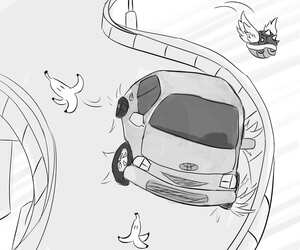Toyota skids off course, but is not completely lost
The past couple of months have thrown a series of speed bumps at the Toyota Motor Corp.
First, the auto manufacturing giant was forced to recall 3.8 million vehicles in October to replace faulty floor mats. Within the past month, the car company recalled 2.3 million vehicles to repair gas pedals, and last week it voluntarily recalled 437,000 hybrid cars to fix the software that controls the brake pedals.
Unfortunately, this recent string of recalls is not a new phenomenon.
Consumers have been complaining about Toyota gas pedals since 2001, when the manufacturer redesigned them to react to electronic sensors rather than physical pressure. Reluctant to start a thorough investigation of the complaints, the problem persisted. As a result, multiple people died in crashes, unable to regain control of their vehicles as they accelerated to excess speeds.
In addition to the tragedy of accidents resulting from the malfunctioning components, the Toyota situation is disconcerting as owners find themselves in a dangerous state of uncertainty.
“My Toyota is not a recalled model, but honestly I still don’t feel safe,” said Paige Hill, a senior majoring in public relations. “They have recalled so many vehicles it’s like I’m constantly wondering when mine will be recalled also.”
“I don’t feel comfortable with what Toyota is doing … the way they handled the problem wasn’t very good,” said Tim Kinzer, a sophomore majoring in business administration.
Although information has now been released to Toyota drivers about their vehicles, the company informed consumers at a snail’s pace. Toyota should have investigated the issues when buyers started complaining in 2001, and the public should have been made aware of the issue immediately. Had the company done so, it’s possible many of these issues could have been rectified.
Now, it appears that Toyota is adopting the better-late-than-never philosophy.
After a dormant period that produced little to no information, the company has shifted into another gear. Rather than dwell on the “should haves,” Toyota is finally taking action and making a push to inform the public about its recalls, repairs and regrets.
On Monday, the Wall Street Journal reported that 500,000 cars have been fixed and 50,000 repairs are being completed daily on affected vehicles. Toyota released an advertisement apologizing and promising to prevent future accidents from occurring. Dealers have extended service hours on nights and weekends to fix more cars as rapidly as possible and, to top it all off, the company is considering offering significantly longer warranties to earn back its consumers’ confidence.
In making these moves, Toyota is taking the hit gracefully as it estimates a total loss of $2 billion during the time that it halted production and sales.
Despite the well-deserved beating Toyota has taken, could there be a light at the end of this dark road?
The company is repenting and mending its mistakes. Surprisingly, it appears consumers have noted such efforts.
Of the four student Toyota owners I spoke to, all four said they would still consider buying a Toyota in the future because of their loyalty to the company.
“[Mistakes] happen to everybody and other companies have messed up before,” said Arjun Sharma, a junior majoring in computer science.
Three students who do not own Toyotas said the recalls would not stop them from considering the company for a future purchase as well.
“Because Toyota has been considered a vanguard … I have a feeling they’re going to make a comeback. They made a mistake, but I feel like they’re going to improve upon it,” said Garrett Weaver, a senior majoring in biomedical engineering.
While media pundits continue to spur on the demise of the Toyota corporation, it appears the sentiment toward the car company is not as negative as many might believe. Despite its current losses, Toyota shows potential for remaining a leading car manufacturer after this mess is resolved.
Rather than looking into the rear view mirror and regretting what should have been done differently, Toyota is actively informing consumers about its cars as quickly and effectively as it can and is taking the proper corrective and preventative measures.
That’s all we can ask for at this point.
Danielle Nisimov is a sophomore majoring in public relations. Her column “On the SCene” runs Thursdays.

